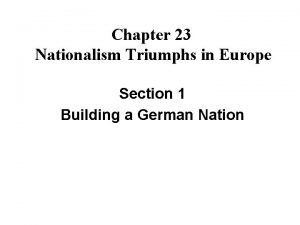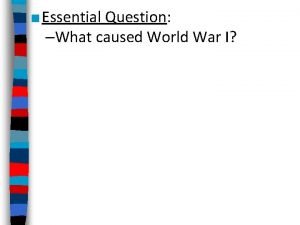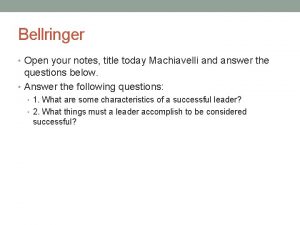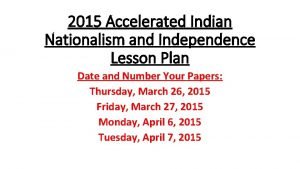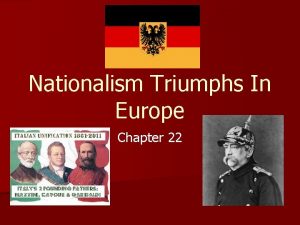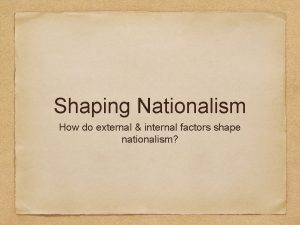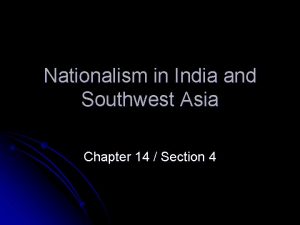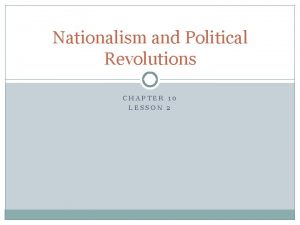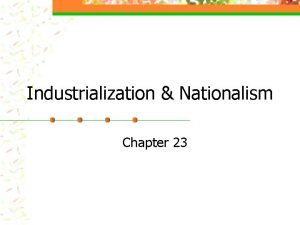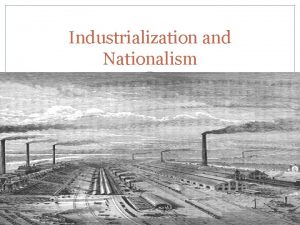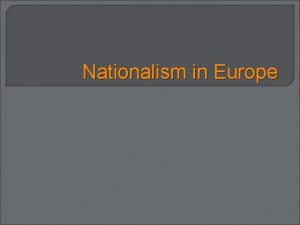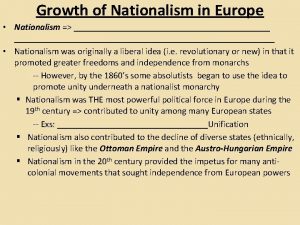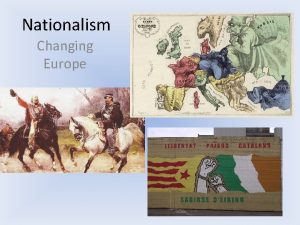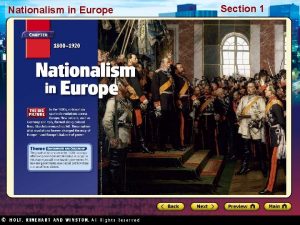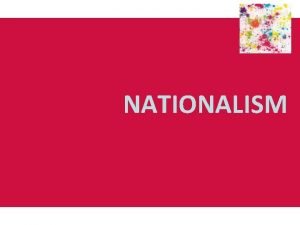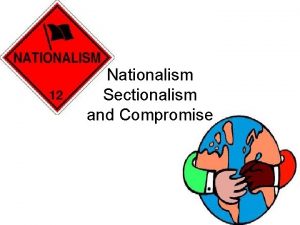Nationalism in Europe n What is nationalism and










- Slides: 10

Nationalism in Europe n What is nationalism and how did it both break up and unify countries in Europe? Austria. Hungary Russia Ottoman Empire Germany Italy

Nationalist Thought n n n n Three different types of political thought in 1800 s Europe: 1) Conservatives - wanted to keep everything the same and allow absolute monarchs to rule (nobles, landowners) 2) Liberals – wanted more power for Parliaments and only the educated or landowners vote (middle class, merchants) 3) Radicals – favored drastic change, all people should vote & government should follow Enlightenment (poor, workers) Other people in Europe were also upset that their country was ruled by a foreigner or they weren’t united People should be loyal to a country not a king People should unite into countries based on their nationality Since many people shared a common culture and history, the idea of Nationalism emerges Nationalistic Revolutions will breakout in Europe The Congress of Vienna fails to stop nationalist revolutions

Nationalism Culture – History shared way a common of life past Nationality – shared ethnic ancestry Language. Nation. State shared communication Religion- Territory shared by – land belongs to most group n n Positives – people overcome differences, overthrow imperial rule, democratic governments, competition leads to advance Negatives – Forced assimilation of minority, extreme nationalism, competition leads to war

Nationalism Challenges Conservative Rule Three empires will begin to weaken due to nationalism 1) The Austrian Empire ruled by the Hapsburgs n The Austrians controlled at least 12 different ethnic groups n Revolutions begin to breakout in the empire starting in 1848 (Czechs). Hungary also wants to split from Austria (1866) n Emperor Franz Joseph creates two countries but unites them as one kingdom Empire is now called Austria-Hungary. n 1866: Austria loses Seven Weeks War to Prussia would gain much of Austria’s northern German States n

2)The Ottoman Empire ruled by Muslim Turks n The Ottomans controlled Greeks, Arabs, Armenians, and several other Balkan (Slavic) areas n Revolutions breakout in Greece (1827) & the Balkans Greeks aided by Britain, France, Russia. After losing war, Ottomans are pressured to grant equal citizenship to all 3) The Russian Empire ruled by the Romanovs n n. The Romanovs begin a policy called Russification, which forced Russian culture/language on all other ethnic groups n. Nationalistic revolution starts in Poland in 1830, Czar Nicholas I tries to expand Russia in Crimean War and loses n. Alexander II tries to reform Russia but is assassinated, Alexander III strengthens absolutism – more nationalist revolts

Radicals in France Louis-Philippe(XVIII) returns to power after Napoleonic Wars n After 18 years of rule, French people grow tired of a monarchy (again!) and violence erupts n New constitution is created (again!) calling for a president to share power with the assembly. Monarchy abolished (again!) n French people elect a new President named Louis-Napoleon (Napoleon’s nephew) n Four years later he takes the title of Emperor Napoleon III n People welcome a strong ruler & Napoleon III begins to modernize France and creates jobs n

Unification of Italy In the N. Italian state of Sardinia, King Victor Emmanuel II (liberal) named Camillo di Cavour as his Prime Minister n Cavour wants to unify all Italians. He will convince Napoleon III to help drive Austria out of Northern Italy n The combined armies of Cavour & Napoleon III will win & gain all of Northern Italy except for the Venetian Region n Sardinia King Victor Emmanuel II Camillo di Cavour

n n n So. Italy- nationalists were led by Giuseppe Garibaldi From Sicily, Garibaldi leads his “red-shirts” against conservatives in S. Italy & would unite So. Italian Kingdoms King & Cavour meet with Garibaldi. Decide to unite all Italy Victor Emmanuel would be King - Constitutional Monarchy n The two remaining states, Venice & the Papal states would join the rest of Italy in 1866 & 1870 n The Pope could still control the Vatican but Rome would now become the capital of the Kingdom of Italy n Textbook: Page 260 Ques 1 & 2. Page 261 Ques 1 -3 Rome Garibaldi Pope Pius XI

Unification of Germany n Rioters in Berlin, force a liberal constitution for the Kingdom of Prussia (new King and Parliament) n Wilhelm I would become new King of Prussia Wilhelm appoints a junker (landowner) named Otto von Bismarck to become his Prime Minister n Bismarck was a master of “real politik” which means the politics of reality (tough) n Bismarck runs the country w/o Parliament’s consent – rule by blood & iron n Bismarck’s goal is to expand Prussia’s territory & unite all of the German states n Wilhelm I Weak will be devoured by the strong! Otto von Bismarck First, Bismarck convinces Austria. Hungary to join him in a war against Denmark n

n n Prussia would then turn against Austria-Hungary and starts the Seven Weeks War The loss humiliates Austria & gives Prussia N. German states Second, Prussia would then go to war with France to gain control of southern German states n Prussia will win the Franco-Prussian War – humiliation for Napoleon III n Third, Prussia unites all of the new territory into the Second Reich (2 nd German Empire) n Wilhelm becomes Kaiser of the German Empire – Bismarck is Prime Minister (Chancellor) n Page 263 – Ques 1 & 2
 Nationalism triumphs in europe
Nationalism triumphs in europe What caused wwi
What caused wwi Bellringer security
Bellringer security Nationalism in europe lesson plan
Nationalism in europe lesson plan Nationalism triumphs in europe
Nationalism triumphs in europe Nationalism triumphs in europe
Nationalism triumphs in europe Internal and external factors of nationalism
Internal and external factors of nationalism Nationalism in india and southwest asia
Nationalism in india and southwest asia French revolution political spectrum
French revolution political spectrum Chapter 23 industrialization and nationalism
Chapter 23 industrialization and nationalism Chapter 10 industrialization and nationalism
Chapter 10 industrialization and nationalism
